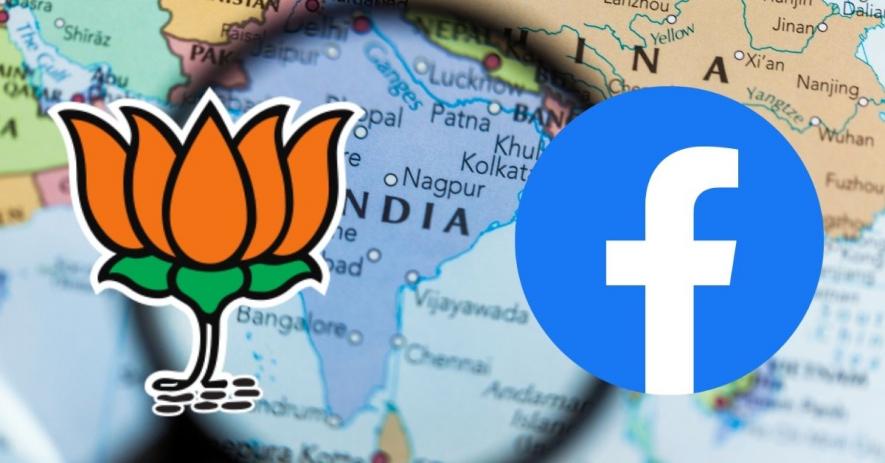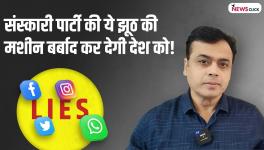Most Facebook Fact-checking Partners in India Fail to Fact-check BJP-led Misinformation

Social media giant Facebook has repeatedly come under the scanner after multiple reports of the company evading responsibility for hateful content and misinformation thriving on the platform. A Buzzfeed report from last month revealed that Facebook “ignored or was slow to act on evidence that fake accounts on its platform have been undermining elections and political affairs around the world.”
This revelation was made just days after an investigative report by The Wall Street Journal (WSJ) on Facebook’s top public policy executive in India, Ankhi Das, supporting Prime Minister Modi and ‘disparaging’ opposition parties. An earlier WSJ piece had disclosed that Das blocked applying Facebook’s hate speech rules to “Hindu nationalist individuals and groups flagged internally for promoting or participating in violence.”
Hints of preferential treatment to the ruling BJP were also discovered last year when, right before the Lok Sabha elections, Facebook took down thousands of pages and accounts for “coordinated inauthentic behaviour” but did not name BJP-linked pages with much higher follower count.
Facebook has a rampant misinformation problem. False news on the platform is believed to be true by regular users who, when emotionally triggered, amplify these claims.
Misleading news or outright lies are pushed for several reasons, the most popular being political one-upmanship. But Facebook refrains from fact-checking political speech which it considers “most scrutinised” by the media.
Facebook relies on independent third-party fact-checkers worldwide — eight in India — to “reduce the spread of false news and other types of viral misinformation, like memes or manipulated photos and videos.”
Alt News analysed the reports published by Facebook’s Indian fact-checking partners in the past year. We observed that between August 2019 to August 2020, barring two outlets, none highlighted individuals or organisations that are arguably the most frequent sources of misinformation.
Most of Facebook’s fact-checking partners in India have scantily covered BJP-led misinformation
Facebook has eight fact-checking partners in India namely — Agence France-Presse (AFP), Boomlive, The Quint, India Today, Factly, FactCresendo, Newsmobile and Vishvas News.
Alt News has picked five sources of misinformation that come out on top as per our reports — BJP IT cell head Amit Malviya, BJP national spokesperson Sambit Patra, Pakistani Canadian author Tarek Fatah, Sudarshan News or its editor-in-chief Suresh Chavhanke and OpIndia. We analysed their posts carrying misinformation against fact-check stories published by Facebook’s fact-checking partners between August 2019 to August 2020. This was also compared with stories on Alt News.

In our analysis, we found that apart from Boomlive and The Quint, others have either not published reports or published very few reports identifying any of the five sources of misinformation.
It is noteworthy that not all false claims by the selected individuals or organisations are made on Facebook. However, since all of them are highly influential in the social media ecosystem, their posts are picked up and amplified across platforms including Facebook. Misinformation is mirrored identically or in form of screenshots, thus demands scrutiny.
But content posted by politicians is not eligible for review by third-party fact-checkers, as per Facebook’s policy. For instance, last year Amit Malviya had shared a video of a protest rally against the Citizenship Amendment Act (CAA) in Lucknow, where he claimed ‘Pakistan Zindabad’ slogans were raised. This was false. The protesters were chanting ‘Kashif Saab Zindabad’ in relation to AIMIM leader Kashif Ahmad who led the rally. The only Facebook fact-checking partner that picked up the story failed to mention Malviya in the report. Sambit Patra has also been found misquoting individuals. His tweet mocking Rahul Gandhi talking about red and green COVID zones used a clipped video of the Congress leader. The video was then amplified by others on social media yet most fact-checking partners of Facebook did not deem it worthy of a story.
It may be pointed out here that nearly every political party or its supporters has been found promoting disinformation but those associated with the BJP unequivocally have an upper hand in terms of volume. Members or supporters of opposition parties like Congress or AAP did not make the cut to feature in our analysis for the simple reason that they promoted fewer false claims in the chosen time frame. Furthermore, several other names worthy of mention — Madhu Kishwar, Rishi Bagree, Prashant Patel Umrao, Sanjay Dixit and Gaurav Pradhan among others — are not a part of this analysis based on volume and impact of content.
India Today
India Today has published only one report each on Amit Malviya, Sudarshan News/ Suresh Chavhanke and OpIndia between August 2019 and August 2020. Compared to this, Boomlive has written seven stories on Malviya and five each on the other two sources of misinformation. The Quint, in contrast, has published 14 stories that highlight OpIndia and Alt News has penned 35.
Organisations need to be certified by the International Fact-Checking Network (IFCN) to become a Facebook partner. These outlets need to meet the IFCN’s code of principles which includes non-partisanship and erratum in case of misleading news. India Today and its Hindi counterpart Aaj Tak have been found publishing false claims on several occasions. They’re even known to have fallen for fake Twitter accounts and fictitious stories. But more often than not, the organisations have failed to publish clarification notes or fact-check its own errors.
Vishvas News
Another outlet that deserves attention is Vishwas News, a part of Jagran Media Network — the parent organisation of the Hindi daily Dainik Jagran. In the past year, Vishvas News has penned no articles that identify Amit Malviya, Tarek Fatah, Sudarshan News/ Suresh Chavhanke and OpIndia. It has written one report on false news shared by Sambit Patra and debunked two pieces of misinformation (1, 2) targeting him. In fact, Vishvas News has also debunked misinformation targeting Tarek Fatah though the author has not been identified as a source of misinformation. Between August 2019 to August 2020, Alt News and Boomlive have respectively published 18 and 12 stories that identify Fatah. Both organisations have also penned compilations (Alt News, Boomlive) on the misinformation shared by him.
Newsmobile
In the case of Newsmobile, we noticed an interesting trend. While the outlet has recognised Sambit Patra as a misinformation source in only one story, it has debunked four claims that targetted him. All of these were morphed images (1, 2, 3, 4).
Others
AFP and Factly have also scantily published stories that mention the names of the top sources of misinformation. But the fact-checking method applied by these outlets differs from the rest in terms of the format. Both rarely highlight names of individuals/ organisations in their reports. In fact, Factly is known to publish brief fact-checks on viral claims and the corresponding truth.
Fact-crescendo also has a scanty coverage of misinformation shared by the sources in question.
Multiple attempts to contact India Today, Vishvas News and Newsmobile went unanswered. We also reached out to Facebook via email and were sent a boilerplate response that failed to address specific questions raised by Alt News. A part of its response is as follows: “Facebook’s fact-checking program uses a combination of technology and human review to detect and demote false news stories. We use signals and feedback from people on Facebook, to predict potentially false stories for fact-checkers to review. When fact-checkers rate a story as false, we significantly reduce its distribution in News Feed and show warning labels with more context. We also want to empower people to decide for themselves what to read, trust, and share. When third-party fact-checkers write articles about a news story, we show them in Related Articles immediately below the story in News Feed. We also send people and Page Admins notifications if they try to share a story or have shared one in the past that’s been determined to be false.”
This article was first published in Altnews.
Get the latest reports & analysis with people's perspective on Protests, movements & deep analytical videos, discussions of the current affairs in your Telegram app. Subscribe to NewsClick's Telegram channel & get Real-Time updates on stories, as they get published on our website.
























